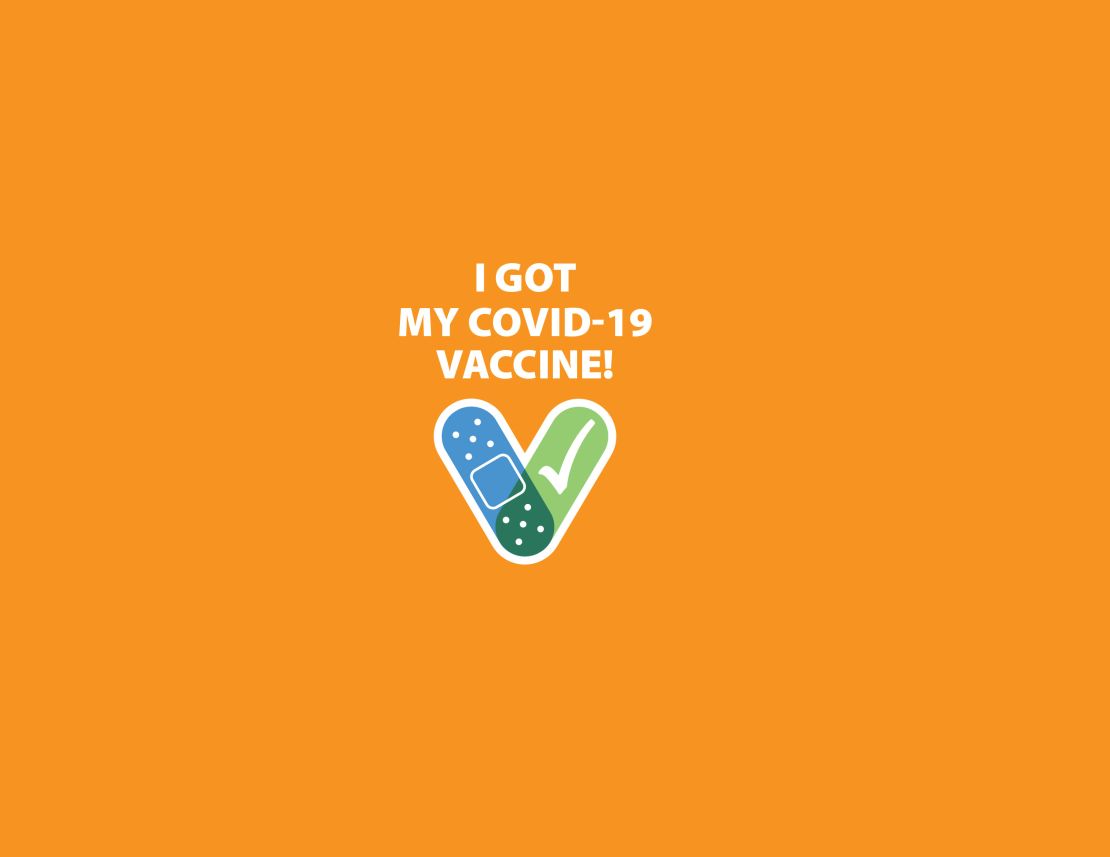Could wearing a Covid-19 vaccine sticker after you get vaccinated really encourage other people to do the same?
Experts and the US Centers for Disease Control and Prevention hope that’s the case.
“I definitely think that public health swag has some weight,” infectious disease epidemiologist Jessica Malaty Rivera told CNN. “The flu vaccine band aid has become iconic. Something similar like that for Covid-19, like a button or a sticker, would be something that I would personally wear proudly and encourage others to as well.”
Research shows that visual displays of public health measures are a good thing, from normalizing getting the flu shot to wearing a mask to prevent the spread of coronavirus. As the United States started vaccinating health care workers this week, some hope something as simple as a sticker may help spread the message to get vaccinated.

The CDC designed two Covid-19 vaccine stickers to encourage health care workers to wear them after getting vaccinated. There’s an orange and a white version that say, “I got my Covid-19 vaccine!”
Malaty Rivera specializes in translating complex scientific concepts into accessible information. She is the science communication lead at the Covid Tracking Project, a volunteer organization that compiles state-level coronavirus data.
“There’s definitely psychology to it,” Malaty Rivera said. “The ‘I got the flu shot’ sticker for health care providers definitely gives patients and people coming hospital settings some confidence that they are entering places that are safe and protected.”
She said other research has shown how bracelets have been used to help parents keep their children on a vaccine schedule in developing countries.
After nurse Sandra Lindsay became the first person in New York to receive the Covid-19 vaccine Monday, she donned a white and green sticker on her scrubs. “Crushing Covid-19. Got my vaccine,” the sticker read.
“I feel hopeful today, relieved. I hope this marks the beginning of the end of a very painful time,” she said in a press conference.
The vaccine represents “hope, healing, a restoration of public health and safety” and is a “step in the right direction,” said Lindsay, an intensive care unit nurse at Long Island Jewish Medical Center.
Wearing a sticker may even give people a sense that hope that we’re heading in the right direction, Malaty Rivera said.
“If people are just walking around with their masks, it’s normal for 2020,” she said. “If you start seeing a growing trend of people wearing stickers, that could start giving you some excitement that things are happening, people are getting protected and we might be getting closer and closer to the end of this.”
However, the stickers are unlikely to change the minds of people who are worried about getting the vaccine or opposed to it. Vaccine hesitancy in the US may be the biggest challenge facing the vaccine’s rollout, said Dr. Susan Bailey, president of the American Medical Association, in a statement Saturday.
“Manufacturing, distribution, and administration still pose challenges, but the biggest threat remaining may be people’s willingness to get vaccinated,” she said.
Some people are wondering if the vaccine is safe because it came out much quicker than the typical vaccine, which takes years to create.
“I don’t think that the stickers are going to do much to change peoples’ minds on their preconceived conclusions about the vaccine,” Malaty Rivera said. “I think vaccine hesitancy needs to be targeted through very specific communications.”
“Vaccine hesitancy predates the Covid-19 vaccine and we have a long history of it here in this country and the way to curb that is to dispel myths, debunk misinformation and equip people with accurate information and data to help them feel confident in the process,” she said.
Regardless of how people feel about the vaccine, the development of it and how scientists worked worldwide to research and help it come together makes Malaty Rivera proud.
“I have never been prouder of science than now and I think we all should be,” Malaty Rivera said.
The goal of public health is people doing things to care for each other, she said. Getting a vaccine is the same idea – you do something for the “sake of others,” she said.
“In the same way we are saying we wear masks for others, we are also getting vaccinated for others,” she said. “Helping each other is going to get us across the finish line.”



